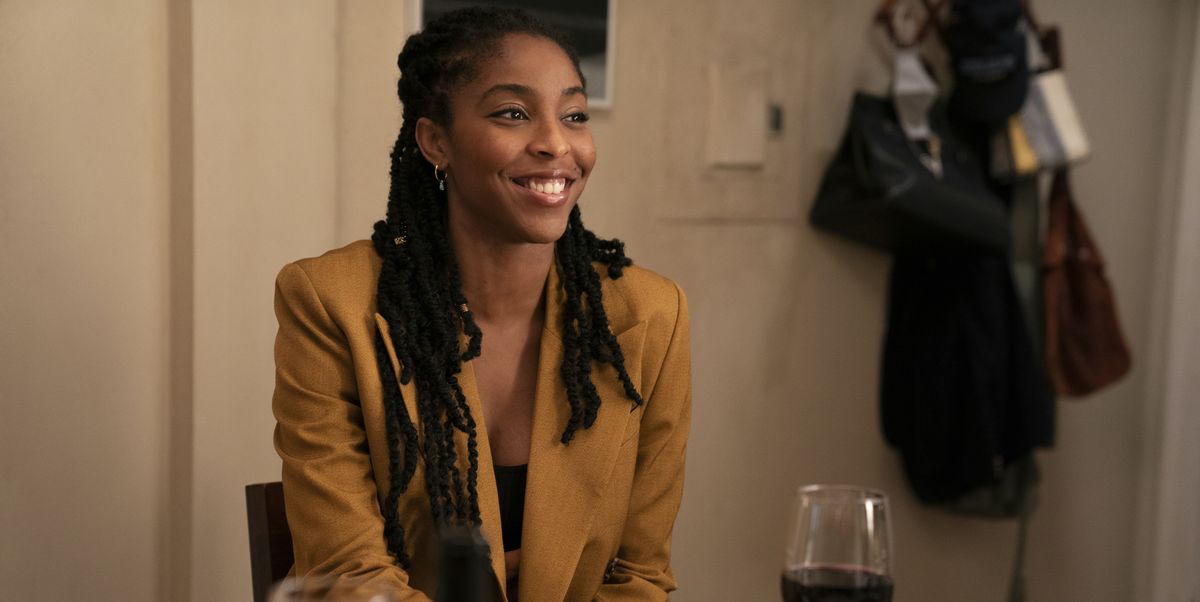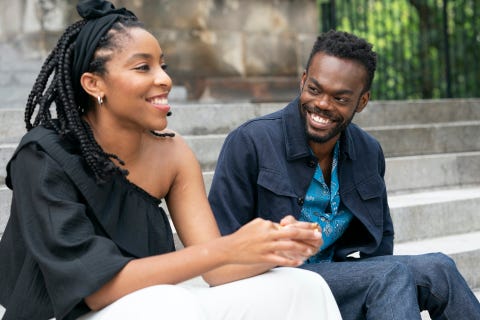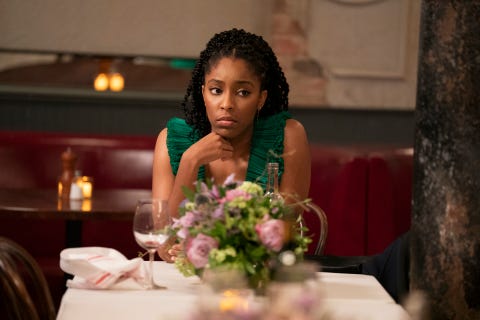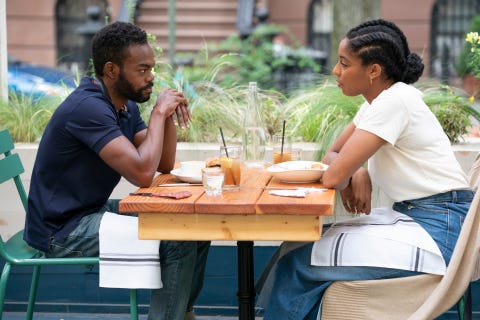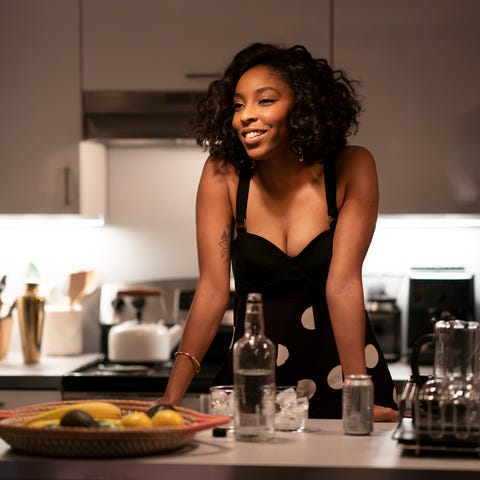When I first jump on the phone with Jessica Williams, she’s a little out of it. “It just took me out,” she says. No, she isn’t talking about the rave reviews for her performance in season 2 of HBO Max’s Love Life—she just got her booster shot.
The California native recently moved back to her home state after nearly a decade in Brooklyn. She first broke out in 2012 as a sharply funny 22-year-old correspondent on The Daily Show with Jon Stewart and was so beloved that people wanted her to take on the host gig when Stewart left. She has since created and co-hosted a hit podcast, 2 Dope Queens, and starred in movies like Netflix’s The Incredible Jessica James and Olivia Wilde’s directorial debut, Booksmart.
In the second season of the anthology romantic series Love Life, Williams plays Mia Hines, a hyper-independent millennial who works at an auction house. Mia emanates effortless cool. She’s the kind of person who can make scrunchies look high fashion or confidently order weird dishes like a chicken Caesar (hold the chicken, sub in broccoli) and have you believe you’re the weird one for overthinking it. She’s the love interest of The Good Place’s William Jackson Harper, who leads the series as Marcus, a book editor whose marriage implodes soon after meeting her. Mia and Marcus are two people who share crackling chemistry and a penchant for self-sabotage, and this season is all about watching them try and fail and try again to make a relationship work. Initially, they attempt to be friends, but it is clear to viewers as soon as Dionne Warwick’s “You’re Gonna Need Me” starts playing in the background when they first start texting that Marcus is a goner.
I spoke to Williams over the phone recently about why rom-coms are hard, being inspired by the outspoken women in her family, and intimidating men who are shorter than her.
Mia is a very unique character for TV but she’s someone who many viewers—and I’m sure you too as a former Brooklyn resident—recognize as a person they either do know or could know IRL. Was her relatability what attracted you to this part?
Yeah, what I love about Mia is that she’s kind of complicated and has depth. I understood where she is coming from having lived in Brooklyn for a bit. She’s someone who is pushing against being vulnerable, but wants to be seen and be loved. There’s also something about her that’s always on the go the way that a lot of people in New York are. I was really excited to play her because she seemed like someone that I knew.
I love the way Mia reads Marcus the first time they meet. He points out his white wife at the party they’re at and she knowingly says, “That makes sense.” She sends him into an existential crisis with just three words. Was it fun playing someone with that kind of confidence?
Yeah, it was really fun playing someone with that much confidence. Again, it reminded me of women that I knew. In my family, we’ve got women that can give you shit. I don’t come from a house of women that are passive. It was really fun to play someone who had a sense of humor and who spoke her mind. She was necessary because she kept Marcus on his toes.
You and William have such an easy chemistry, it feels like you’ve known each other for ages or at least worked together before. How did you develop that?
Well, first of all, I’m a really big fan of Will’s. He’s so kind and thoughtful and talented and gracious that he was just a joy to work with. As an actress, I felt really comfortable with him in that I felt like he wasn’t going to judge me or be rude. That gave me a safe space to create Mia in. I think that that really informed a part of the chemistry as well. We had quite a bit in common too. Will, when he had a break, would have his Switch on set and I fall asleep with my Nintendo Switch on my pillow. So, there were certain things that we had in common that helped Marcus and Mia have chemistry on camera. And then he just has a great sense of humor, and so did the directors and the crew that we had on this show, so that was able to make it on TV. Sometimes you can have a great sense of humor, but if the people that are directing it don’t, then it’ll never see the light of day. I think everybody was on a similar page as to how they wanted the show to be and how they wanted Marcus and Mia to be.
There were a lot of moments where I thought, “This could be scripted, but I’d believe it if it were an ad lib.” That’s how natural the writing was. Can you remember any ad libs you made?
Yeah, there’s definitely one after we go see Ola’s play where I’m like, “a little ass drink for my little ass boy.” That was definitely improvised, definitely wasn’t scripted. [Laughs]
Episode 7 is Mia’s dedicated episode. We finally see her aloof cool girl exterior break down and she gets to be vulnerable, especially opposite her dad played by Blair Underwood. What was that episode like for you?
That episode was really, really fun. Will had done so much work, it was nice to give him a few days off. I was so excited. I was already in the season when I found out that Blair Underwood and Kimberly Elise were playing my parents. They’re so legendary. The episode is directed by Stacey Muhammad, who is this wonderful, thoughtful director. I really felt like she and I were working together to tell the story of Mia. At one point, I was with Blair Underwood at 7 A.M. at a Red Lobster shooting this scene and I just felt in the zone because he’s such a good actor. Him and Kimberly, they’re truly great actors. I felt like I better show up and show out because I didn’t want to let them down.
It’s so rare to get that kind of interiority from a love interest for a show. We’re flashing back to ’97 when she was young, we’re getting into her relationship with both parents and how that impacts her current relationship. It was a lot more information about her than I ever thought we were going to get.
Again, it goes back to playing Mia and trying to present her as fully as possible because she reminds me of people that I know and that have a lot going on. They can appear one way, they can appear mysterious. They can also sometimes self-sabotage. I think Mia’s growth in the season is about facing how she grew up because a lot of times how you grow up is sort of your model of what love looks like. If you don’t have those tools, then you can tend to be a bit self-destructive in your intimate relationships. I was really excited about exploring that idea with her because I think it speaks to a universal experience.
The word of mouth around Love Life has been really feverish, just preaching the gospel of season 2 and your performance. I’ve especially seen a lot of Black women recommending this season to other Black people. There was a whole era of Black rom-coms in the ‘90s and early aughts and it’s been pretty quiet since then, so I think Black viewers in particular were hungry for that kind of content again.
Yeah, I’m really happy with the response that it’s gotten and mostly I’m just happy about people that say they see themselves in the show because that’s what it’s all about. I feel great when I watch something on TV or go to the movies or I hear a song and I feel myself in it. That to me is the most rewarding thing, as someone who is a person of color and a woman in this day and age. It feels incredible that there is this beautiful word of mouth happening between women that look like me and people that maybe don’t that just really relate to the show. That’s really one of the reasons why I do what I do, so that people feel seen. So, that’s incredible. I’m so grateful for that.
Did you guys ever discuss what it would mean to portray “Black love”? It gets idealized a lot but for as much as it’s discussed, it’s rare to see it on screen. Was there any kind of pressure to get it right?
No, as far as Mia and Marcus, I didn’t feel any pressure to portray “Black love.” Perhaps between Rachelle Williams, the co-showrunner, [show creator] Sam Boyd, and [co-showrunner] Bridget Bedard, and the whole writer’s room, there was a discussion. My job was to protect Mia’s space and to make sure that I was being true to her and to make sure that I was as present as possible so that Mia read authentically on screen with Marcus. I’m inherently Black, so that colored Mia as a character, and Will is Black and that colored Will’s character as well. I think we just got to act and be true to our characters. It’s really hard, if not impossible, to explain what it feels like to be Black. It wasn’t like I was going in every scene being like, “Okay, I’m Black and this is how this scene’s going to go.” It was moreso I just got to be myself and make Mia’s choices and do things the way Mia would do. I’m so happy that it is Black love and that’s portrayed on screen. I’m so happy that that comes through.
Totally. Knowing that Sam Boyd is a white man, there was a way this formula of two Black leads could have gone wrong. It was a surprise for me and so many to see how authentic these characters felt as people, and specifically to get Black people right. Just to run through the list of what this season has going for it: Keith David is the voiceover narrator, you got OG Aunt Viv Janet Hubert, Blair Underwood and Nikki Giovanni as guest stars, and even small stuff like Mia’s mom hoarding old Ebony magazines because of the Black heartthrobs. Everything felt so authentic. I cringed zero times, which is a real accomplishment. So, it’s interesting to hear what was going on between you and the writers, and what you were able to fill in or what was already there on the page to make this season feel as real as it did.
Yeah. I’ve been on a few different sets, and on this set, I feel like even if I felt something wasn’t right, I was able to bring it up. I text one of them or call one of them, and they were always available. Will’s also an executive producer on the show and I felt like we had the agency to say when things didn’t feel right and when they did. A lot of times because of pride, you’re not really allowed to do that as an actor. I felt like this was such a great set in that it was very collaborative and my thoughts and ideas were really respected. I think that comes through. It just makes things better when you get different perspectives. Especially in a season about people of color, you should just listen to the people of color on set and around you. But it’s crazy a lot of times that just doesn’t happen.
You were the lead in a feature-length rom-com, 2017’s The Incredible Jessica James, and now you’re in this anthology series that is romantic as hell. What do you like about the rom-com genre?
What I love about the rom-com genre is it’s really difficult. It’s more difficult than it seems. I think so often it’s a genre where people roll their eyes and it has a bit of a bad rep. Because it often makes you feel warm and fuzzy, people think it’s really easy to do and it’s just not. It’s really hard to get right. I think rom-coms are no longer about this formulaic thing that we used to see where it’s just two straight white people falling in love. Now is the time to crack that genre open. A rom-com could be about two best friends that are falling out of love with each other platonically, it can be between queer people, people of different walks of life, races, identities, genders. I think we haven’t really explored that, and it’d be great to try now, especially in this day and age, to show it as authentically as possible because the feeling of wanting to be seen for who you are is universal.
I saw a funny tweet that I must bring up. This viewer really appreciated that the show didn’t try to hide the fact that you’re taller than William. She wrote, “Let the girls be stallions on screen.” So, what was it like to be a stallion on screen? Do you feel like your height has ever limited your options as an actress?
Oh my gosh, that’s hysterical. Yeah, there’s a line too, where Will asks me what my shoe size is, and I say 11, because I am a size 11. I’ve been tall for a long time, I think I’ve been tall since I was 13. A lot of tall women can relate. You go to a bar and guys are so inherently intimidated that they want to stand butt-to-butt with you and see who’s taller. Being tall definitely colors so much of my identity, and the identities of a lot of the women that I know. I think anybody who’s a size 11 and over, forget about it as far as having—tiny feet whimsy is the best way I can describe it, where you kind of just get to wear whatever cute-ass designer shoes you want, or you can walk into the store and get whatever shoes you want. That’s pure whimsy to me. I could not imagine being able to live that way. I was excited that they wanted me to be in the rom-com because sometimes I won’t even be in the conversation to star opposite a man, because they’ll be intimidated because I’m tall. So yeah, that does affect my career in that way.
There’s this one scene I’m thinking about directed by a great director, Pete Chatmon. I think it was in the second episode, Will and I are doing a walk-and-talk in the park where Miranda got married in Sex and the City and Marcus mentions that. And I had to duck under this tree branch, because that’s how it is when you’re tall, but Will clears it. I pulled Pete aside and I was like, “Oh, Pete, I don’t know if you can see this, but I have to move this tree branch out of the way.” And, Pete was like, “No, it’s good.” And I was like, “What do you mean?” He’s like, “No, it’s good. You’re tall. Let’s do that.” Those little things that we kept in the show I think help it ring true to viewers. I didn’t see that tweet, but fuck yeah, let stallions be stallions! That’s tight. And justice for size elevens and over as well because we need to be able to look cute in some heels. We need to be able to flex with our feet. We exist.
This interview is edited and condensed for clarity.
This content is created and maintained by a third party, and imported onto this page to help users provide their email addresses. You may be able to find more information about this and similar content at piano.io
